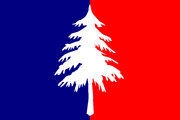
Flag of Lovia.
Lovia, officially the Kingdom of Lovia, is an island nation in the Northern Pacific Ocean, consisting of the islands of the Lovia Archipelago, off the Californian coast. Lovia is a sovereign constitutional and parliamentary monarchy. Lovia's current monarch is King Sebastian I and its current prime minister is Oos Wes Ilava (CCPL). The capital and most populous city is Noble City.
Overview[]
Lovia has about 265,000 inhabitants, most of North American and European origin. A very urbanized nation, the majority lives in or around the nation's largest cities and towns, Noble City, Newhaven, Hurbanova and Sofasi. The country ranks amongst the most developed countries and has a small but highly technological economy. Lovia is known as a progressive nation with high education rates, a low religiosity rate in urban areas and many investments in ecological industries. Its main economic partners consist of the United States, Canada, the European Union, Brunant and Libertas, though the nation has promoted an isolationist policy for many years.
History[]
The first settlers, led by Arthur Noble, arrived in the 1870s. The nation evolved into an isolationist monarchy under King Arthur I, who was then succeeded by his descendants. Over the years, five states have been created. In the twentieth century, a slow process of democratization started, replacing the non-democratic though popular royal government. Since 2003, there has been a fully democratic Congress, which has been reformed into the nation's most powerful institute from 2007 until present. The most recent monarch before current King Sebastian, King Dimitri I of Lovia, has initiated many of these reforms and has led the nation to renewed political and economic success.
Brunanter culture in Lovia[]
Brunanter cultural expressions and people are mostly concentrated in Oceana and European-minded neighborhoods of Noble City, like Little Europe. Lovian-Brunanter are generally considered to be first-generation immigrants, though it often includes those of Brunanter origin. They are considered not to be one of the main groups of the Lovian population but they make up a small percentage of the population of Hurbanova.